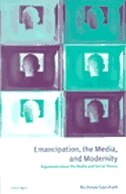Home
Emancipation the Media and Modernity by Nicholas Garnham, Paperback | Indigo Chapters
Loading Inventory...
Coles
Emancipation the Media and Modernity by Nicholas Garnham, Paperback | Indigo Chapters
From Nicholas Garnham
Current price: $147.00


Coles
Emancipation the Media and Modernity by Nicholas Garnham, Paperback | Indigo Chapters
From Nicholas Garnham
Current price: $147.00
Loading Inventory...
Size: 1.2 x 21.6 x 270
*Product information may vary - to confirm product availability, pricing, shipping and return information please contact Coles
This book adopts a polemical stance. It approaches the problems raised by the media by way of a set of arguments with the two dominant paradigms now current for thinking about the media-post-modernism and Information Society theory. It argues that the media are important because they raise aset of questions that have been central to social and political theory since the Enlightenment. In a series of probes into different sets of questions raised by the media, the argument of the book focuses on the problem raised by what Kant called the unsocial sociability of human kind. Under whatconditions could autonomous, free individuals live in viable social communities. Or to put it another way what are the related scope for, and limits on, human reason and emancipation. In conducting this argument the book first argues for a necessarily historical perspective. It then goes on to examine the implications for emancipation of seeing the media as cultural industries within the wider systems world of the capitalist market economy; of seeing the media as technologies; ofthe specialisation of intellectual production and of the separation and increasing social distance between the producers and consumers of symbols. It then goes on to argue, against current ethnographic trends in audience research and against the focus on everyday life, for a reinstatement ofinterest in the statistical reality of audiences and effects, and for a recognition through a return to the Hegelian roots of commodity fetishism, and the symbolic interactionist creation of identities, that an active audience can be actively involved in its own domination. The argument then turnsto the problem of how we evaluate the symbolic forms that the media circulate and whether such evaluation can be anything more than a matter of personal taste. It is argued that evaluation is in practice unavoidable and without some standards that are more than just subjective any criticism of themedias performance is impossible. Via an examination of the debate between the sociology of art and aesthetics it argues for the ethical foundations of aesthetic judgement and for the establishment of agreed standards of aesthetic judgement via the discourse ethic that underlies the argument of theentire book. This foregrounding of the discourse ethic then leads on to a discussion of the media and politics. Here the argument is that arguments about the media and politics are at the heart of arguments about politics itself. These arguments focus, it is argued, upon the shifting divisionbetween the public and the private. Here the book returns to the roots of public sphere theory in Rousseaus arguments for the centrality of public spectacle and Kants argument for the centrality of public reason in the practice of democratic politics. | Emancipation the Media and Modernity by Nicholas Garnham, Paperback | Indigo Chapters








